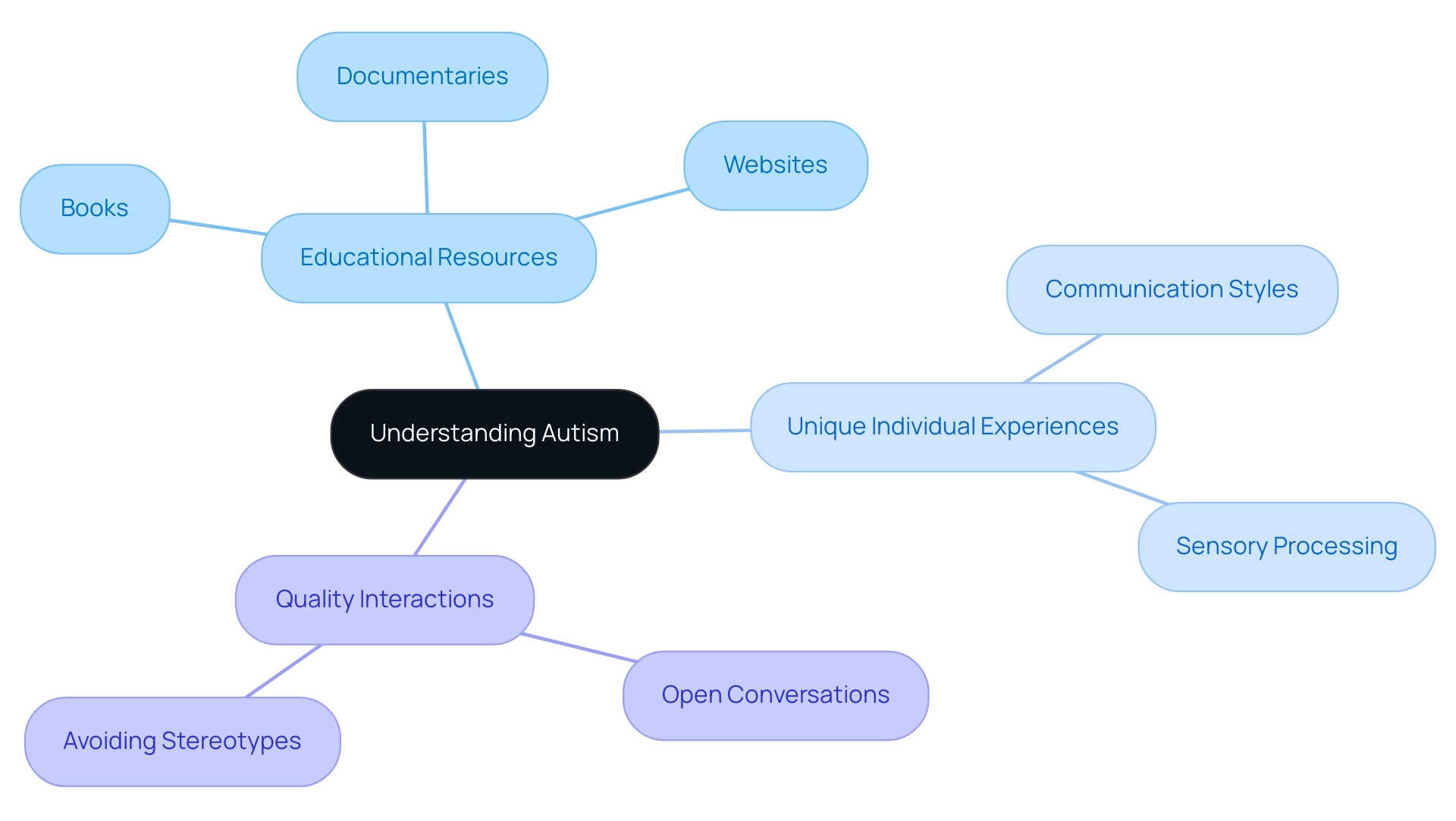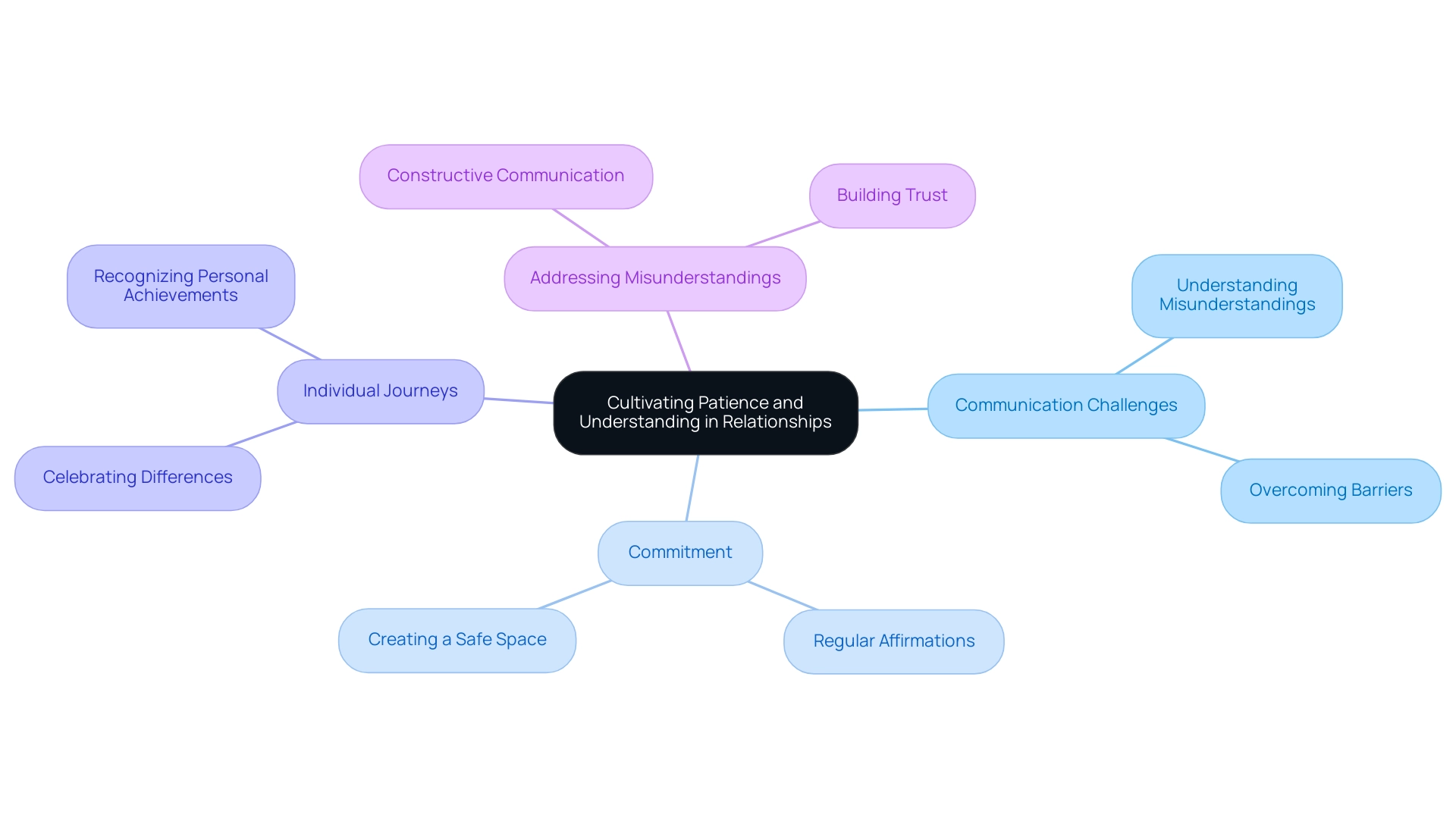Introduction
Navigating the complexities of relationships within the autism community requires a strong foundation of understanding and empathy. As individuals on the autism spectrum bring their unique perspectives and experiences to dating, it becomes essential to educate oneself about autism spectrum disorder (ASD) to foster meaningful connections.
This article delves into the intricacies of forming relationships with autistic individuals, offering practical strategies for effective communication, addressing sensory sensitivities, and cultivating patience.
By embracing the unique strengths that autistic partners possess, such as creativity and loyalty, and by engaging in open dialogues about feelings and preferences, couples can navigate challenges together. As this journey unfolds, the rewards of love and understanding in these partnerships can lead to profound connections that enrich both lives.
Understanding Autism: A Foundation for Successful Dating
To effectively navigate connections within the autism community, it is crucial to start by educating yourself about autism spectrum disorder (ASD). Autism presents itself in diverse ways, influencing communication styles, social interactions, and sensory processing. Engaging with a variety of resources—such as informative books, insightful documentaries, and reputable websites—can equip you with the knowledge needed to foster deeper connections.
Recent studies, including one that analyzed the quality of connections reported by 171 teachers and 28 paraeducators, highlight that high-quality student-teacher interactions (STRs) correlate with improved behavioral outcomes. As Caplan et al. state, "High quality student-teacher connections are associated with reduced levels of externalizing and internalizing behaviors for autistic students," highlighting the significance of recognizing these dynamics in different contexts.
Engaging in open conversations with your partner about their experiences and perspectives on autism is especially important when dating someone on the spectrum, as it not only improves your awareness but also strengthens your bond. Remember, each autistic individual is unique, which is important to keep in mind when dating someone on the spectrum; therefore, it is vital to avoid assumptions based on stereotypes. Embrace their uniqueness, stay receptive to learning about their specific needs and preferences when dating someone on the spectrum, and reflect on how your understanding can positively influence your connection.
Such an informed approach is essential, as quality connections often lead to better social and behavioral outcomes. The case study titled "Impact of Positive Response Strategies on Student-Teacher Relationships" further supports this notion, showing that teachers' use of positive strategies significantly improves stress and social functioning for young autistic students. This reinforces the idea that education is an empowering tool for advocates.

Effective Communication: Key Strategies for Connecting
To enhance communication within relationships, especially when dating someone on the spectrum, it is essential to prioritize clarity and directness. Utilize simple language and steer clear of idioms or metaphors that could lead to confusion. When expressing feelings or concerns, communicate openly and honestly, while remaining sensitive to your significant other's perspective.
Active listening plays a pivotal role in these interactions; ensure you provide your partner the space to share their thoughts without interruption. Pay close attention to non-verbal cues, as body language and facial expressions can significantly affect comprehension. Regular check-ins are vital; they not only promote mutual understanding but also allow for the timely resolution of any miscommunications.
The knowledge of Board Certified Behavior Analysts (BCBAs) can be crucial in this context, as they provide strategies that improve communication and assistance for families managing connections when dating someone on the spectrum. Furthermore, effective approaches for daily routines, such as hand washing and showering, can serve as practical applications of communication strategies, fostering comfort and confidence in these activities. As Debra Hosseini wisely states,
The greatest gift you can give someone with developmental differences is acceptance, love, and support.
Embracing these principles can create a solid foundation for nurturing relationships, supported by the growing demand for BCBAs who can guide families through these challenges.
Navigating Challenges: Sensory Sensitivities and Emotional Dynamics
Awareness of sensory sensitivities is crucial when dating someone on the spectrum, as these sensitivities can significantly influence their comfort in different environments. Sensory overload can feel like intense anxiety, a need to escape the situation, or difficulty communicating, making it essential to initiate discussions about sensory preferences and aversions. For example, if your significant other has a heightened sensitivity to loud noises, opting for quieter venues during outings can make a substantial difference.
Furthermore, emotional dynamics within partnerships may vary, particularly when dating someone on the spectrum, as individuals on the spectrum often face challenges in expressing emotions or may respond uniquely to emotional situations. In these instances, approaching such moments with patience and nurturing open dialogues about feelings can greatly enhance emotional intimacy. Customizing your support strategies to align with the sensory profile of your companion is especially important when dating someone on the spectrum, as it not only promotes comfort but also strengthens your relationship.
As highlighted in the case study 'Moving Forward with Comprehensive Support for Individuals with Autism Spectrum Disorders,' recognizing specific sensory needs can empower individuals to thrive. Additionally, with 59,976 board-certified behavior analysts (BCBAs) in the U.S., professional guidance can further enhance these support strategies, ensuring that both partners feel understood and valued.
Cultivating Patience and Understanding in Your Relationship
Building a meaningful connection while dating someone on the spectrum often necessitates a deeper level of understanding and commitment. It's essential to develop patience, as misunderstandings are a natural aspect of any connection and may happen more often. According to the Els for Autism organization, many autistic individuals face unique relationship challenges, particularly when it comes to dating someone on the spectrum, with studies indicating that communication barriers can lead to misunderstandings.
Haley Moss eloquently captures the sentiment of personal achievement, stating,
I might hit developmental and social milestones in a different order than my peers, but I am able to accomplish these small victories on my own time.
This underscores the importance of acknowledging and celebrating each individual's unique journey, as emphasized in her case study titled 'Celebrating Differences.' By committing to address misunderstandings constructively, both partners can create an atmosphere where feelings are expressed without fear of judgment, particularly important when dating someone on the spectrum.
Regular affirmations of your commitment not only reinforce the idea that you are a united front navigating challenges together but also foster a safe space where both individuals can thrive. This empowering approach strengthens the bond you share and lays the groundwork for a resilient and supportive partnership.

Celebrating the Unique Rewards of Dating on the Spectrum
Establishing a bond while dating someone on the spectrum can lead to profound connections and enriching experiences. Notably, about 9% of autistic adults in the U.S. are married, reflecting the unique challenges they face in romantic relationships compared to the general population. Many autistic individuals exhibit exceptional strengths, including remarkable attention to detail, unwavering loyalty, and boundless creativity.
However, individuals with High-Functioning Autism (HFA) may struggle with social interactions and decision-making when dating someone on the spectrum, which requires patience and compassion from those they are involved with. It's crucial to celebrate these qualities and discover joy in shared interests and activities. Engaging in open discussions about your partner's passions not only fosters deeper understanding but also encourages them to express their unique perspectives.
As noted by author Fayge Orzel, it is important to clear up these misunderstandings to help others understand and accept autistic adults and their capacity to have positive connections. Furthermore, factors such as geographic location and socioeconomic status can impact marriage rates and dynamics among autistic individuals. By embracing the unique rewards of your partnership, you cultivate a fulfilling bond that thrives on understanding, love, and mutual respect.
This approach not only strengthens your bond but also enhances the overall well-being of both partners, allowing for a truly supportive and empowering relationship.
Conclusion
Navigating the complexities of relationships within the autism community requires a commitment to understanding and empathy. By educating oneself about autism spectrum disorder (ASD), individuals can foster deeper connections and improve communication with their partners. Recognizing the diverse ways autism manifests—through unique communication styles, sensory sensitivities, and emotional dynamics—empowers couples to address challenges together.
Effective communication is paramount in these relationships. Utilizing clear language, practicing active listening, and maintaining open dialogues about feelings and preferences can significantly enhance understanding and connection. Additionally, being mindful of sensory sensitivities and customizing support strategies creates an environment where both partners feel comfortable and valued.
Cultivating patience and celebrating the unique strengths of autistic individuals further enriches these partnerships. By acknowledging each partner's journey and committing to constructive dialogue, couples can create a supportive atmosphere that fosters emotional intimacy. Ultimately, the rewards of love and understanding in relationships with autistic individuals lead to profound connections that enhance the well-being of both partners. Embracing this journey not only strengthens bonds but also highlights the beauty of diversity within relationships, paving the way for fulfilling and empowering experiences.
Frequently Asked Questions
Why is it important to educate yourself about autism spectrum disorder (ASD) when connecting with the autism community?
Educating yourself about ASD is crucial because autism presents itself in diverse ways, affecting communication styles, social interactions, and sensory processing. This knowledge helps foster deeper connections within the community.
What do recent studies say about student-teacher interactions for autistic students?
Recent studies indicate that high-quality student-teacher interactions correlate with improved behavioral outcomes for autistic students, leading to reduced levels of externalizing and internalizing behaviors.
How can open conversations benefit relationships with individuals on the autism spectrum?
Open conversations about experiences and perspectives on autism improve awareness and strengthen the bond between partners. It's essential to avoid assumptions based on stereotypes and embrace each individual's uniqueness.
What role does clarity and directness play in communication when dating someone on the spectrum?
Clarity and directness are vital for effective communication. Using simple language, avoiding idioms, and expressing feelings openly can enhance understanding and reduce confusion.
How important is active listening in relationships with autistic individuals?
Active listening is crucial as it allows partners to share their thoughts without interruption and helps in understanding non-verbal cues, which can significantly affect comprehension.
What are sensory sensitivities, and why are they important in relationships with autistic individuals?
Sensory sensitivities refer to how individuals on the spectrum may react to different sensory stimuli, which can influence their comfort in various environments. Discussing these preferences is essential for creating a comfortable atmosphere.
How can emotional dynamics differ in partnerships involving individuals on the spectrum?
Individuals on the spectrum may face challenges in expressing emotions or may respond uniquely to emotional situations. Patience and open dialogue about feelings can enhance emotional intimacy in these relationships.
What strategies can enhance communication and support in relationships with autistic partners?
Strategies include understanding sensory profiles, customizing support approaches, and seeking guidance from Board Certified Behavior Analysts (BCBAs) to improve communication and relationship dynamics.
What challenges do autistic individuals face in romantic relationships?
Autistic individuals may experience communication barriers and misunderstandings, making it essential for partners to develop patience and commitment to navigate these challenges together.
How can partners celebrate the unique strengths of individuals with autism?
Partners can celebrate strengths such as attention to detail, loyalty, and creativity by engaging in open discussions about shared interests and encouraging the expression of unique perspectives.
What impact can geographic location and socioeconomic status have on the relationships of autistic individuals?
Geographic location and socioeconomic status can influence marriage rates and dynamics among autistic individuals, affecting their romantic relationships.
What is the overall benefit of establishing a bond with someone on the autism spectrum?
Building a bond with someone on the spectrum can lead to profound connections and enriching experiences, enhancing the overall well-being of both partners through understanding, love, and mutual respect.




